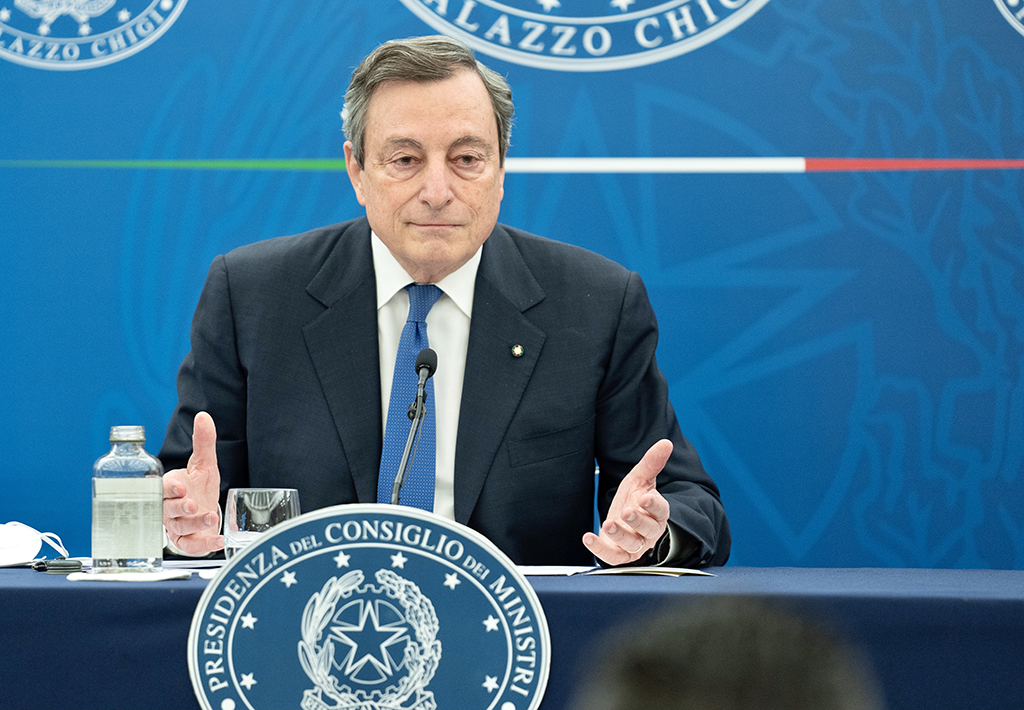I’ll explain why Draghi is not popular in Parliament for the Colle

Draghi, language and psychopolitics. Italics by Teo Dalavecuras
The newspaper of the Berlusconi family took note, not without visible satisfaction, of Mario Draghi's " wear and tear" in the race for the fatal hill, that of the Quirinale. Paolo Mieli, with his indisputable authority, certified this morning on Radio24 , albeit in the usual amused tone, that now no one in the media and in the world of politics pretends to have feelings even remotely similar to the sympathy for the current Prime Minister.
Once again, the election of the President of the Italian Republic is the moment of truth in Italian public life. Let's say that the fiction according to which only a few irreducible antipathyants like Marco Travaglio annoyed the presence of Draghi at Palazzo Chigi has dissolved and, on the other hand, at least in this the director of the Fatto Quotidiano legitimately claims the legacy of Indro Montanelli: in sniffing the air he pulls and telling it a little earlier than the others, thus managing to build, with modest expense, the reputation of being a contrarian.
There will certainly be explanations of this only apparently sudden turnaround in the dark folds of political politics, explanations that I do not even try to imagine: it would be pure ambition. I remain still at the image offered by Matteo Renzi, one who knows a lot, of the start of the Palio di Siena, fascinating precisely for the total absence of understandable rules for those who do not participate but limit themselves to watching the show.
Apart from the "serious" reasons, that is related to the struggle for power, of the about-face, which occupy the legions of experts who are following this particular very Italian war of succession, I would like to put forward a hypothesis of explanation that could also be considered frivolous . The main reason why Draghi has never achieved in his recent political role a popularity even remotely comparable to that of a Giuseppe Conte (let's leave aside the opinion polls that are worth like Monopoly money, a lot but only for the players sitting at the table ) is because in public communication the current Prime Minister uses plain language that is understandable to anyone. In the last press conference, for example, he said clearly that the decision to keep schools open was a "political choice" of the government, without hiding behind convoluted arguments.
Draghi's is a way of expressing himself that is not right or wrong, opportune or inappropriate, but simply forbidden. In Italian public discourse, everything is allowed, from Grillo's systematic profanity to the "difficult speech" of his friend Conte; from Salvini's fake popular speech to Berlusconi's fervoros as a salesman; from the words from a neighbor of Pope Francis to the esoteric reasoning of Bettini to the vaguely threatening allusions of D'Alema. Anything not to use the evangelical "yes yes no no". Only in this way, in fact, can we then leave the interpretative work to the insiders, we can contradict ourselves with impunity and above all avoid the greatest danger: that anyone in the people tries to get an idea of what is happening. Ours is still the land of intermediaries: between men and God, between the Palace and the people, between servants and masters, between facts and news. Obviously, transgressing such a pervasive prohibition, as Draghi did, is intolerable, and fully justifies those who gave him, in recent days, the arrogant.
It is legitimate to ask, however, why our prime minister could have made such an unforgivable mistake, it is unthinkable that a man with his CV ignored one of the fundamental rules of Italian public life. I try to make a hypothesis: perhaps Mario Draghi is suffering from an even more serious disorder than the mania to express himself in an understandable way: he gives meaning to that thing – objectively unpronounceable for anyone with ambitions for power in Italy – which is called "personal dignity" . Well, if someone in this country agreed to open the door of Palazzo Chigi to a man who cares about his personal dignity, it means that a year ago our situation was really desperate, and it could mean that today it is less so. We hope…
This is a machine translation from Italian language of a post published on Start Magazine at the URL https://www.startmag.it/mondo/perche-draghi-non-e-tanto-popolare-in-parlamento-per-il-colle/ on Wed, 26 Jan 2022 13:52:24 +0000.
